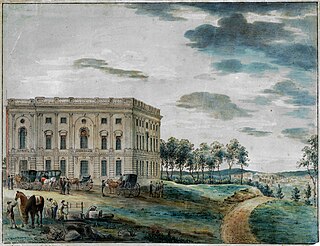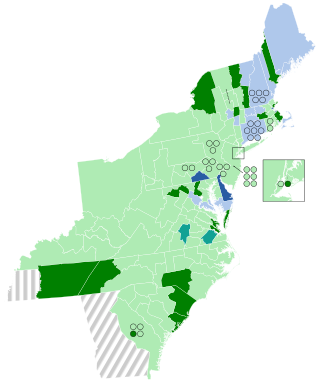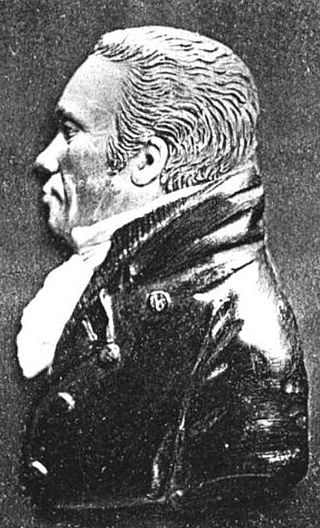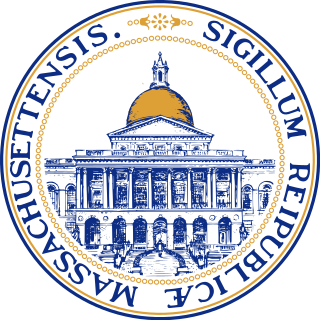| Elections in Massachusetts |
|---|
 |
The majority requirement was met in all 17 districts in the 1804 elections.
| District | Incumbent | Party | First elected | Result | Candidates [lower-alpha 1] | |
|---|---|---|---|---|---|---|
| Massachusetts 1 "Suffolk district" | William Eustis | Democratic-Republican | 1801 | Incumbent lost re-election. New member elected. Federalist gain. | √ Josiah Quincy (Federalist) 51.0% William Eustis (Democratic-Republican) 49.0% | |
| Massachusetts 2 "Essex South district" | Jacob Crowninshield | Democratic-Republican | 1803 | Incumbent re-elected. | √ Jacob Crowninshield (Democratic-Republican) 58.7% Nathan Read (Federalist) 41.2% | |
| Massachusetts 3 "Essex North district" | Manasseh Cutler | Federalist | 1801 | Incumbent retired. New member elected. Federalist hold. | √ Jeremiah Nelson (Federalist) 56.8% Thomas Kitteridge (Democratic-Republican) 43.2% | |
| Massachusetts 4 "Middlesex district" | Joseph Bradley Varnum | Democratic-Republican | 1794 | Incumbent re-elected. | √ Joseph Bradley Varnum (Democratic-Republican) 71.5% Timothy Bigelow (Federalist) 28.0% | |
| Massachusetts 5 "Hampshire South district" | Thomas Dwight | Federalist | 1803 | Incumbent retired. New member elected. Federalist hold. | √ William Ely (Federalist) 62.9% Samuel Fowler (Democratic-Republican) 36.7% | |
| Massachusetts 6 "Hampshire North district" | Samuel Taggart | Federalist | 1803 | Incumbent re-elected. | √ Samuel Taggart (Federalist) 69.3% Solomon Snead (Democratic-Republican) 30.5% | |
| Massachusetts 7 "Plymouth district" | Nahum Mitchell | Federalist | 1803 | Incumbent lost re-election. New member elected. Democratic-Republican gain. | √ Joseph Barker (Democratic-Republican) 60.4% Nahum Mitchell (Federalist) 38.3% Others 1.3% | |
| Massachusetts 8 "Barnstable district" | Lemuel Williams | Federalist | 1798 | Incumbent lost re-election. New member elected. Democratic-Republican gain. | √ Isaiah L. Green (Democratic-Republican) 60.1% Lemuel Williams (Federalist) 39.4% | |
| Massachusetts 9 "Bristol district" | Phanuel Bishop | Democratic-Republican | 1798 | Incumbent re-elected. | √ Phanuel Bishop (Democratic-Republican) 62.2% Nicholas Tillinghast (Federalist) 30.8% Josiah Deane (Democratic-Republican) 3.4% John Bowers (Federalist) 3.4% | |
| Massachusetts 10 "Worcester South district" | Seth Hastings | Federalist | 1801 (Special) | Incumbent re-elected. | √ Seth Hastings (Federalist) 51.2% Edward Bangs (Democratic-Republican) 48.8% | |
| Massachusetts 11 "Worcester North district" | William Stedman | Federalist | 1803 | Incumbent re-elected. | √ William Stedman (Federalist) 60.8% John Whiting (Democratic-Republican) 39.0% | |
| Massachusetts 12 "Berkshire district" | Simon Larned | Democratic-Republican | 1804 (special) | Incumbent retired. New member elected. Democratic-Republican hold. | √ Barnabas Bidwell (Democratic-Republican) 59.7% Daniel Dewey (Federalist) 40.3% | |
| Massachusetts 13 "Norfolk district" | Ebenezer Seaver | Democratic-Republican | 1803 | Incumbent re-elected. | √ Ebenezer Seaver (Democratic-Republican) 64.6% Thomas B. Adams (Federalist) 35.0% | |
| Massachusetts 14 "York district" (District of Maine) | Richard Cutts | Democratic-Republican | 1801 | Incumbent re-elected. | √ Richard Cutts (Democratic-Republican) 51.9% Joseph Leland (Federalist) 31.4% Daniel Cleaves 16.7% | |
| Massachusetts 15 "Cumberland district" (District of Maine) | Peleg Wadsworth | Federalist | 1792 | Incumbent re-elected. | √ Peleg Wadsworth (Federalist) 63.8% William Widgery (Democratic-Republican) 19.1% Isaac Parsons (Democratic-Republican) 17.1% | |
| Massachusetts 12 "Lincoln district" (District of Maine) | Samuel Thatcher | Federalist | 1802 (Special) | Incumbent retired. New member elected. Democratic-Republican gain. | √ Orchard Cook (Democratic-Republican) 54.6% Samuel Thatcher 45.4% | |
| Massachusetts 17 "Kennebec district" (District of Maine) | Phineas Bruce | Federalist | 1803 | Incumbent retired. New member elected. Democratic-Republican gain. | √ John Chandler (Democratic-Republican) 64.5% Benjamin Whitwell (Federalist) 35.5% | |












